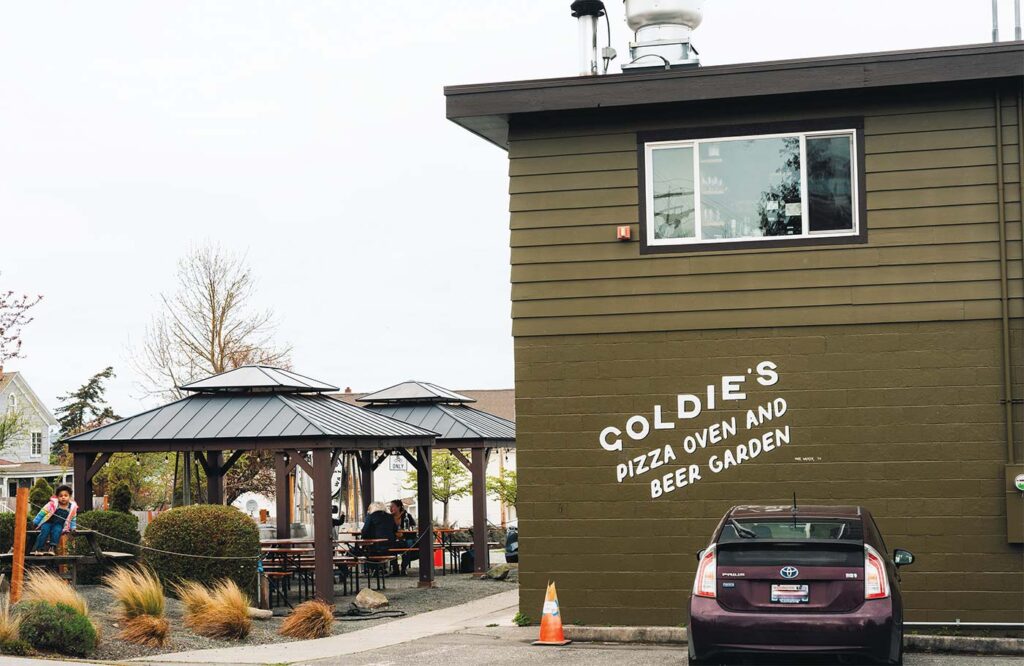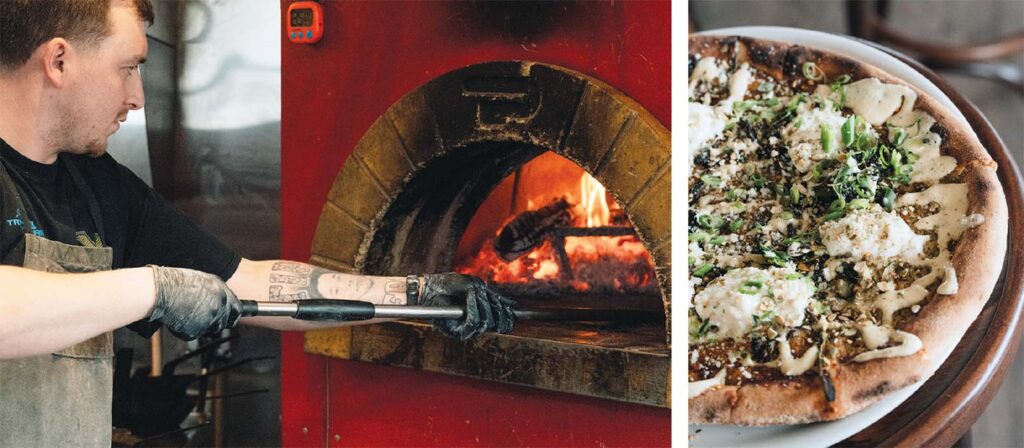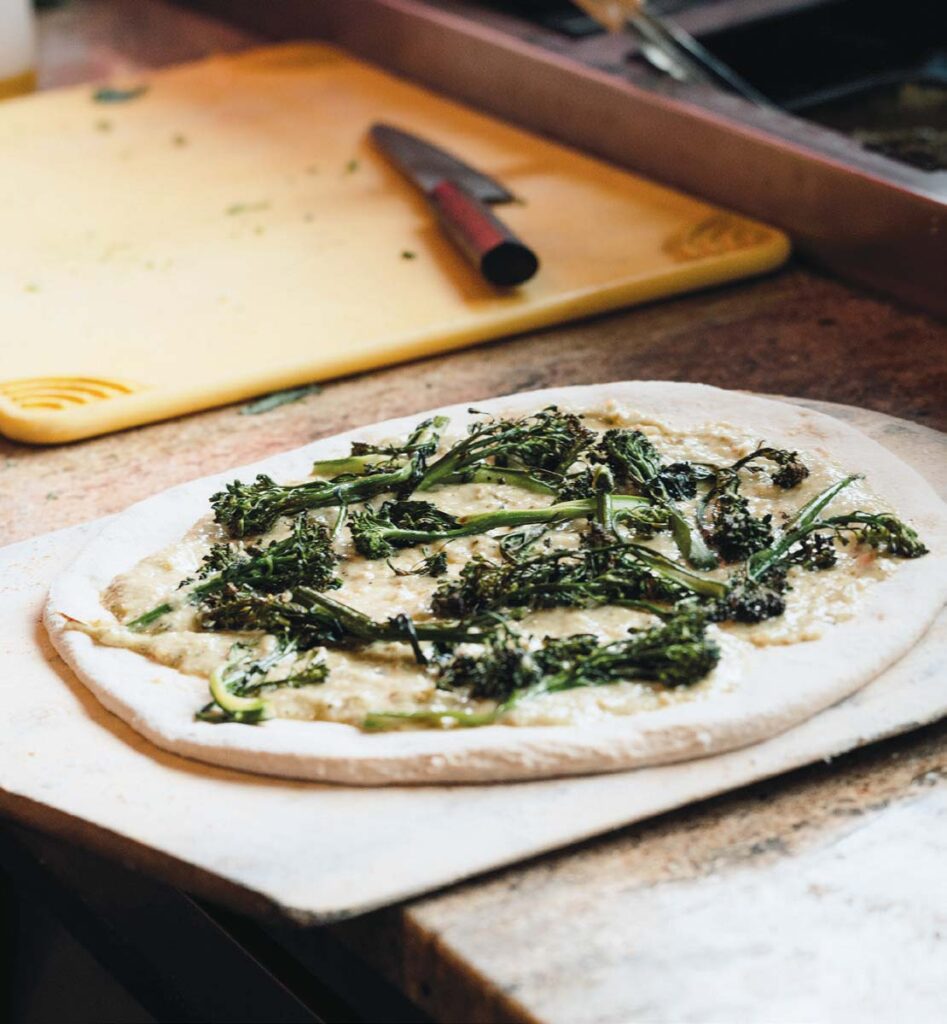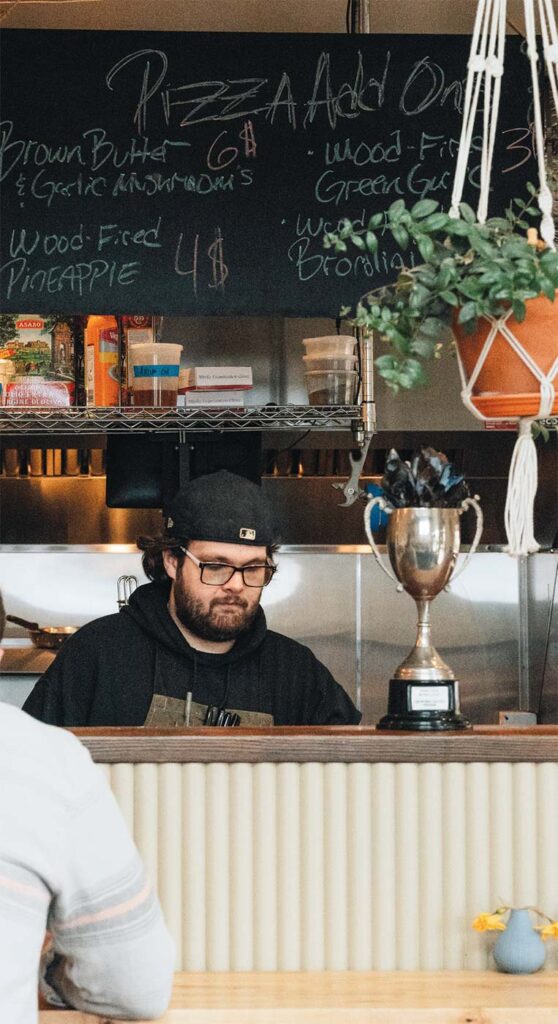The team behind Goldie’s and The Roost built a home for all in Coupeville

“Goldie’s is the everybody spot. You come in for a slice, draft beer, have your kids running around around the communal table. It’s kind of like an extension of our homes and backyards.” –Seddy Livingston
It’s a rainy Sunday afternoon in Coupeville, and the lunch rush is beginning at Goldie’s. Pizzas and plates move in and out of the large wood-fire oven, are garnished with fresh herbs and mountains of shredded cheese and sent to tables. Glasses and cutlery clatter among conversation. Friends and neighbors alike stop in for a meal, grab a slice of pizza to go—or simply stop in to wave hello at Goldie’s head chef and owner, Sedrick “Seddy” Livingston. The place is a revolving door of familiar faces and visitors.
Goldie’s, known for its wood-fired pizzas, pasta and small plates, is located on Main Street in the former Ciao space, and its sister The Roost, a small, swanky cocktail bar, is upstairs. The idyllic harbor town is home to some of Whidbey Island’s most beloved small businesses and restaurants, including other projects of Livingston’s collaborators, Sophia Jones (née Kitay) and Tyler Hansen, The Oystercatcher and The Little Red Hen Bakery.
The rush is winding down when Livingston’s wife and daughter stop by, and he excuses himself to sit outside with them. Another chef waves at them through the window. Livingston’s daughter runs into one of her friends. It’s moments like this that the restaurant was built for.
“I want it to be that spot where people get to watch my daughter grow up. Goldie’s is the everybody spot. You come in for a slice, draft beer, have your kids running around around the communal table. It’s kind of like an extension of our homes and backyards,” Livingston says, reflecting on why he was drawn to Whidbey Island. Prior to opening Goldie’s, Livingston was the chef at beloved Seattle pizza joint, Delancey.
Even before he officially moved to Whidbey when Goldie’s opened in 2024, Livingston was welcomed to the community with open arms. That’s how it goes on the island, locals quickly embrace newcomers. None of Goldie’s owners are Whidbey natives, but over the years—13 for Hansen, two for Jones, and one so far for Livingston—they’ve all become touchstones in the community.
“The [COVID-19] years were really challenging, for everybody, but much less so for the restaurants on the island,” says Hansen. “I don’t think any island restaurant went under because of that.”
Hansen says their survival was thanks in part to the rent breaks and eviction moratoriums implemented to protect the community. In towns like Coupeville, the business owners are people you know, not faceless corporations, maintaining strong relationships is essential for a thriving community.
“I think that just kind of sums up what Whidbey and Coupeville are,” says Hansen. “One of those places where everybody wants everybody to succeed.”
This sense of community has rooted Goldie’s since the beginning. When Livingston and Jones recount the Goldie’s origin story, it becomes clear that the restaurant’s support system is much bigger than just its leadership. It’s a network made up of talented staff, local farmers with whom they’ve built relationships for years, locals who support them through the slow seasons and the tourists who fill the restaurant during the busy months.
Jones looks at Goldie’s interconnected web of food and farming, and credits the soft skills—kindness, leadership, community accountability—as much as the hard-won restaurant experience for Goldie’s success.
“I think those things are also very important when you run a small business, because so much of it is about team building,” says Jones. “How do you create an environment that people want to be in?”

The trio of owners is balanced, made stronger by their different skills, and each of their influences is apparent in the restaurant. The pizza and pasta dough, made with the same grain from Ebey Farm Road that Hansen has been using at The Little Red Hen Bakery for years; the menu rotating with the seasons under Livingston’s care; and the wine list, curated by Jones, each bottle sustainably and ethically sourced.
They work in harmony, and if you get a good seat, you can watch the choreography behind the counter while you eat. The inherited wood-burning oven burns brightly in the back of the kitchen, as much an anchor for the dining room as it is for the menu.
The space lent itself naturally to being split in two. Goldie’s is downstairs, and open for lunch and dinner. The Roost, upstairs, is 21+ and only open in the evenings. They’re physically connected, but it’s clear that the establishments are siblings, not the same.
“The Roost is sexy, swanky, where you want to be,” Livingston says.
“And a little weird,” adds Jones. “This is our cocktail bar.” If Goldie’s is about elevated pizza, then The Roost is a step—or short flight of stairs—above that. With cheeky cocktails like “Cassis and Desist,” and “Italian Hand Gestures,” you’re in for a creative and clever experience.
Last spring, Jones and her husband, chef Ben Jones, opened their third restaurant on the island, a walk-up fish and chips counter called Osprey Fish Co. The new spot is playful and fun, with a classic fish and chips menu, as well as some fun additions, like frozen margaritas and Aperol Spritz on tap. Between Osprey Fish Co., Goldie’s, and the fine dining experience at The Oystercatcher, the Jones’ imprint on the island is ever-present.
After living on the island for 13 years, Hansen has similarly found his place. Before Goldie’s and before The Little Red Hen Bakery, Hansen and his wife Sara Hansen ran The Oystercatcher, until Jones and her husband took on the restaurant in 2023.
While focusing on developing their new bakery, Hansen wanted to work with local wheat from Ebey Road Farm.
“It’s always been my mission to use local produce as much as we can from the island,” Hansen says. “Produce is abundant. There’s lots of it during the season….
It was really just kind of looking at all this farmland and starting to slowly talk and work with Clark Bishop of Ebey Road Farm.”
The early years of using local wheat were a challenge. It took a leap of faith from farmer and baker to even attempt baking exclusively with wheat grown on an island where the production stability was unknown.
“He put me up on this terrible field up on the hill, just absolutely no water and our yields were terrible,” Hansen laughs. “And the wheat itself was actually really bad. Just, no protein, really hard to work with. We had to make this entirely different process to make bread out of that wheat, but we did it and we used up all that he’d grown.”

“I think that just kind of sums up what Whidbey and Coupeville are— one of those places where everybody wants everybody to succeed.” —Tyler Hansen

Since those challenging early days, Hansen and Bishop have perfected both the crop and the dough. Now, the wheat is milled onsite at the farm, the Hansens and their team prep all of the dough for Goldie’s in the bakery. The wheat never travels more than two miles across the island from the time it’s planted to the time it’s eaten.
Through all of their projects, Goldie’s leadership has developed relationships with farmers on the island, preferring to get as much produce as possible from a few trusted farms.
“If we’re buying produce from 10 different farms, we don’t really have an impact on that farm,” Hansen explains. “Having these more impactful relationships where we can sit down and kind of help a farmer build their business around what we’re doing as a major part is really important.”
This is how the community on Whidbey seems to function; no one is only partially involved. Friends and neighbors support each other, feed each other and show up for each other.
But it takes more than just the close-knit Coupeville community to help each business succeed. In a place like Whidbey Island, a successful tourist season is essential to a successful year. Locals keep businesses afloat during the slow, rainy season, but tourists bring the businesses to life in the summer, with more than 375,000 visitors passing through the island annually, according to Whidbey News-Times.
“[Tourist season] is realistically what makes it possible for us to live in this really beautiful, special community,” Jones says. “We get to live here without all the tourists eight months out of the year, so we’ve got to welcome them and appreciate the fact that they come through and keep all of the small businesses afloat, and that’s another part of why you love living here.”
This symbiotic relationship between small businesses and tourists brings a sense of mutual appreciation to each interaction on the island. Locals are grateful for the support, and visitors, eager for a taste of island life, are grateful for the welcoming community that they get to join, even if just for a weekend.
GOLDIE’S AND THE ROOST
701 N Main St,
Coupeville, WA 98239
goldiesandtheroost.com
